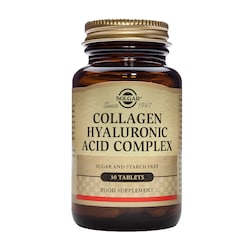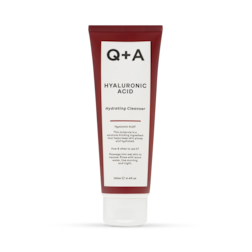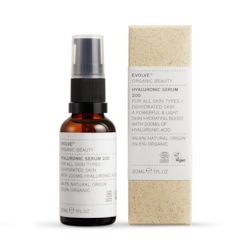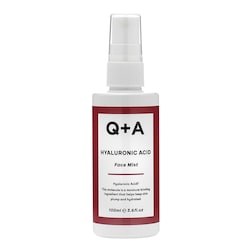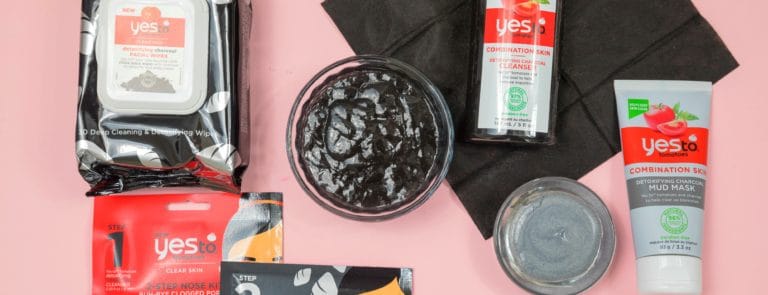15% off €35 OR 20% off €45
Code:CHOOSE
Our favourite hyaluronic acid products

Hyaluronic acid is everywhere these days, but which products are the best for your skincare needs? Discover our top picks to help you choose, right here
Our top picks
Promote healthy skin
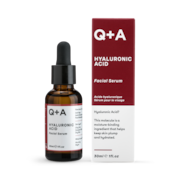
Q+A
Q+A Hyaluronic Facial Serum - 30 ml
€9.00
Unique ability to retain water
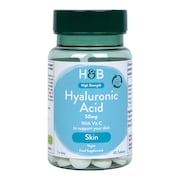
Holland & Barrett
Holland & Barrett High Strength Hyaluronic Acid 50mg 30 Tablets
3 for 2 Mix & Match
€26.69
Brightens skin
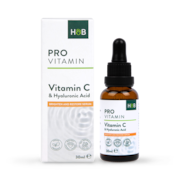
Holland & Barrett
Holland & Barrett Vitamin C + Hyaluronic Acid Serum 30ml
25% off
€11.99
€15.99
Hyaluronic acid has become a cult product in the skincare industry – and for good reason. These days, there are lots of different hyaluronic acid serums and products to choose from.
For some, the choice is music to their ears (or their skin). But for others, having so many different options can be a bit of a minefield, especially if they’re brand new to hyaluronic acid.
Fortunately, there’s plenty of insight, including this article, that’s designed to talk you through what’s what with hyaluronic acid and the best hyaluronic acid serums, as well as introduce you to some of the best products currently on the market.
But why is it good for your skin? Can you use it every day? And which hyaluronic acid skincare products are the best?
Find out the answers to these questions, as well as our top picks for hyaluronic acid products, in our guide.
What is the best hyaluronic acid for skin?
Good question! We started out by saying there are a fair few hyaluronic acid products on the market, but when it comes to hyaluronic acid for skin… which are the best?
How can you tell the good from the bad? And how do you know if they’re going to work for you and how your skin will respond to them?
We can’t give you a personalised prediction of how certain hyaluronic acid serums are going to work on your skin, but what we can do, is provide you with a shortlist of the serums that have been tried and tested and highly rated by some of our customers…
Our favourite hyaluronic acid products
We've got together some of the best hyaluronic acid products, from serums and cleansers to tablets and capsules.
Looking for a boost of vitamin C and hyaluronic acid all in one serum?
Then this is the product for you. Designed to brighten, restore and moisturise the skin – what’s not to love? Skincare, from the experts in vitamins.
It also helps to protect skin from damage and stimulate the skins natural production of collagen to make it appear firmer and more youthful.
- Suitable for vegans
- Added vitamin C
What our customers think: 4.5/5 stars
Julia1977 - Very pleased – 5/5 stars
“I am pleasantly surprised! Really good quality and results! Will purchase it again! Ingredients are good as well”
Elizabeth – 5/5 stars
"This is my second purchase of this product. It was a recommendation from a friend and I can honestly say I love it. It lasts ages and sinks in quickly. I then follow with my usual moisturiser and my skin feels bright and plump. I purchased 2 bottles the first time and would say they lasted around 1 year. I’ve just purchased another 3 bottles as worked out cheaper on the offer however I’d have still purchased at full price as it’s a staple in my skin care routine."
If you’re after a simple facial serum that does what it says on the bottle, look no further than the Q+A Hyaluronic Acid serum.
Suitable for vegans and vegetarians and a whole variety of skin types, this is a great place to start your hyaluronic acid journey.
- Suitable for vegans
- Suitable for dry, oily and stressed skin
- Can be used AM and PM
What our customers think: 4.6/5 stars
Inga – 5/5 stars
"Great product for my skin. My skin can sometimes be sensitive, but the reaction to this product was good. I felt that this serum really helped to hold moisture of my skin; skin felt softer and smoother already after the first use. I had tried a couple other serums before, and none of them gave me this feeling. I am quite happy about this product."
Shani – 5/5 stars
"I have very dry skin. Bought this few months ago. Really worked for my face. Used very expensive serums before. So far this is the best ever serum for me. Loving it."
Didn’t expect to see hyaluronic acid that isn’t a skincare product?
Taking it in tablet form can also benefit your skin health. Just take one a day for a 50mg dose of hyaluronic acid.
- Suitable for vegans and vegetarians
- One a day formula 50mg per tablet
- Comes with added vitamin C
What our customers think: 3.9/5 stars
E0t5 – Best HA I've found – 5/5 stars
"This is the best hyaluronic acid I've found. I use it every day and it retains the moisture in my skin. I have also gifted it to my sisters and they both loved it too. 10/10 would recommend.”
Debsibobs – Brilliant product at bargain price – 5/5 stars
"After a week of using this twice a day after toner (damp skin is a must before applying) my dry and tired skin is already brighter and looking healthier - I'm on my 6th reorder!"
Solgar’s Collagen Hyaluronic Acid Complex tablets are ideal if you want to get all of your skin health supplements from one tablet.
Made with hyaluronic acid, collagen, chondroitin and vitamin C.
- Free from sugar, starch and salt
- Also contains collagen and vitamin C
4.4/5 stars
Alix – 5/5 stars
"Excellent product as expected. Amazing results showing in my skin after just 2 months"
Mrs O – 5/5 stars
"These tablets are great. I feel the difference after taking them and within a short space of time too."
Who said hyaluronic acid was only for serums?
Q+A’s hyaluronic acid cleanser helps to keep your skin plump and moisturised – even after cleanser.
- Suitable for vegans and vegetarians
- Cleansing and quenching all in one
How to use: Emulsify and apply gently to clean your skin. Rinse with water. Use morning and night. Keep out of direct sunlight
What our customers think: 4.9/5 stars
JemmyB – 5/5 stars
"This serum is fantastic, it leaves my skin feeling super soft and hydrated. I use it before bed each night and my skin looks plumper in the morning."
Jazminashleigh – 5/5 stars
"The only way I can describe putting this on my face is heavenly. It is so soft and feels so great. I use it in the morning for a hydrating cleanse. Favourite shower step!!"
Artisanally made, this hydrating serum can be used on all skin types.
- Suitable for vegetarians and vegans
How to use: Apply gently to cleansed face and neck.
What our customers think: 4.8/5 stars
EmmzR – 5/5 stars
"I got this in the advent calendar and I've been using it ever since. I had to do some googling to find out how/why to use it. Now I put it on under a night cream (it retains surface moisture) and wake up to my skin feeling plumped. I really like it and the little sample is going a long way!"
Anonymous – 5/5 stars
"I really love this serum, it soaks in and doesn't leave my face greasy. Will definitely buy it again."
There’s nothing more hydrating than a face mist.
But one with added hyaluronic acid? Super hydrating and suitable for spritzing throughout the day, keep your skin feeling plump, fresh and protected from every day stressors with this hyaluronic acid mist from Q+A.
- Suitable for vegetarians and vegans
- Can be used under or over makeup
- Mist format for ultimate freshness
How to use: Apply to skin at arms length with eyes closed. Can be used as a base layer prior to makeup application, or for an on the go hydration boost.
What our customers think: 5/5 stars
Dr d – 5/5 stars
"A new product from q and a which like all their others doesn't disappoint. I've got dry difficult skin but one spritz of this and I'm glowing!"
Nana – 5/5 stars
"I bought this 2 weeks ago . Wasn’t sure if made a difference . Used everyday - my mature , 67 year old skin, has a healthy glow , feels soft & plumped and definitely seeing a visible improvement in my skin’s appearance ."
How to choose the best hyaluronic acid products for you
When figuring out which hyaluronic acid product is best for you, there are a few things to consider:
- Format. Would you rather apply hyaluronic acid topically or take an oral supplement? Prefer to take tablets or a liquid?
- Added ingredients. If your skin is sensitive or you’re already using a complex skincare regime, you may just want to opt for the simplest form of hyaluronic acid. However if you don’t use any other vitamin C products for example, you could try a combined serum.
- Product style. If you’ve decided you want to apply hyaluronic acid topically, you can choose whether you want to use a mist, a cleanser, a cream or a traditional hyaluronic acid facial serum.
Hyaluronic acid FAQs
Hyaluronic acid may sound rather scientific, but when you strip it back, it’s actually a form of sugar that’s naturally present in our skin.1 This sugar is responsible for retaining moisture within our skin cells which, in turn, helps keep them hydrated, as well as nice and plump. And, on top of all that, hyaluronic acid has got such amazing moisture-retaining properties, that it can prevent any moisture from our skin evaporating into the air. Just so you know, it can reportedly hold 1,000 times its weight in water…2
But….
As we get older (sorry), our natural levels of hyaluronic acid start to dip – just like our levels of collagen and elastin do. Making sure our diets are packed full of fresh fruit and vegetables can help the skin hold on to hyaluronic acid. Plus, there are lots of hyaluronic acid serums and other skincare products that have been specifically designed to help with these healthy ageing issues too.
Before you buy a new skincare product, it’s important to understand what it actually does to your skin.
In this case, hyaluronic acid helps to increase your skin’s moisture levels, as well as being soothing and preventing further moisture loss.3
For more detail on what adding hyaluronic acid to your routine can do for your skin, check out our article ‘What Is Hyaluronic Acid?'.
Yes! Hyaluronic acid is best used before moisturising your skin – just remember to dampen your skin beforehand to get the best results and lock in the moisture.
Using or taking hyaluronic acid is good for our skin for a number of reasons, but mainly because our natural stores of it become more depleted as we age.
This causes the skin to lose its water-binding capacity, which can lead to dry, dehydrated skin and therefore fine lines and wrinkles.4
Topical hyaluronic acid (or HA) is regarded as an excellent topical moisturiser.
But when delving into the details, it’s important to remember that HA will only provide moisture to the top level of skin.
For further penetration though, try to use a serum that contains HA molecules in a variety of different sizes – as opposed to just large ones.5
Handpicked content: Your guide to using acids in skincare
When should I use hyaluronic acid on my face?
You can use it morning and night, but it’s important you get your head around some of the hyaluronic acid ‘rules’ first.
If you’re using a hyaluronic acid moisturiser:
Then use it when you’d normally moisturise your skin. We don’t know what your skincare routine looks like, but you should aim to use a hyaluronic acid moisturiser twice a day after cleansing, exfoliating and applying any other skincare products.
If you’re using a hyaluronic acid serum:
Apply it after you’ve cleansed, while your skin is still damp. Press a couple of drops into your face with the palms of your hands. Don’t forget to apply a moisturizer immediately afterwards to seal in the hydration.
Hyaluronic acid works well with most skincare products. This includes retinol, Vitamin C, alpha hydroxy acids (AHAs), and beta hydroxy acids (BHAs).
The information above is just general guidance, always make sure you follow the directions that come with your hyaluronic serum or moisturiser for the best results and to avoid your skin from becoming overly dry or sensitive.
Is hyaluronic acid bad for your skin?
Generally speaking, hyaluronic acid is considered to be safe to use on all skin types with few side effects (yippee!) This is due to the fact it’s naturally produced by our bodies, so allergic reactions tend to be rare.6
However this does not rule out allergic reactions completely. It is always recommended to carry out a patch test when using new ingredients or products for the first time, especially for those with sensitive skin.
Is hyaluronic acid suitable for everyone?
Despite the ‘acid’ in the name, fortunately hyaluronic acid is safe to use for most skin types – even those with sensitive skin!
It has also been deemed safe to use during pregnancy or breastfeeding.
But if you’re thinking of taking hyaluronic acid supplements, it is worth letting your doctor know as it may have other ingredients which could impact a certain medical concern.
Potential side effects of using hyaluronic acid
Having any side effects from hyaluronic acid is rare, but if you’re prone to allergic reactions it may be best to opt for a lower concentration.
The final say
Hyaluronic acid comes in many different formats, but choosing the right product for you and your skin is key.
We hope we helped you to find the best hyaluronic acid product to slot into your lifestyle in our guide.




